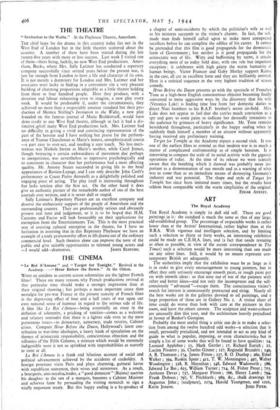THE CINEMA
“Le Roi S'Amuse " and 4, Target for Tonight." Revived at the Academy.--" Hour Before the Dawn." At the Odeon.
WHAT an antidote to current screen solemnities are the lighter French films! There are many reasons why French productions revived at this particular time should make a stronger impression than at their original showing ; but perhaps a more important cause than nostalgia for pre-war France or the present scarcity of French films is the depressing effect of four and a half years of war upon our own national sense of humour in regard to the serious side of life. A film like Le Roi s'Amuse—being essentially an essay in the deflation of solemnity, a pricking of vanities—comes as a welcome and salutary reminder that there is a lighter side even to the most portentous issues—to democracy, autocracy, trade treaties, Cabinet crises. Compare Hour Before the Dawn, Hollywood's latest con- tribution to war-time ideologies, a heavy hunk of speculation on the themes of aristocratic responsibility, conscientious objection and the villainies ofthe Fifth Column, a mixture which would be extremely indigestible were it not so sprinkled with improbabilities as scarcely to exist at all.
Le Roi s'Amuse is a frank and hilarious account of social and political advancement achieved by the accidents of cuckoldry. A foreign potentate visits Paris and plays charming, guttural havoc with republican statesmen, their wives and mistresses. As a result, a bourgeois, anti-royalist, leader, a "good democrat" (Raimu) marries his daughter to the son of a marquis, becomes a Cabinet Minister and achieves fame by persuading the visiting monarch to sign a vitally important treaty. But this happy ending is a by-product of
a chapter of semi-accidents by which the politician's wife as well as his mistress succumb to the visitor's charms. In fact, the self- made man finds himself called upon to make most unexpected sacrifices before he can complete the edifice of his career. It cannot be pretended that this film is good propaganda for the democratic form of Government ; but neither is it good propaganda for the aristocratic way of life. Witty and buffooning by turns, it attacks everything most of us today hold dear, with one sole but important exception: it celebrates with high gaiety the warm humanity of human beings. Victor Francen and Gaby Morlay support Raimu in the cast, all are in excellent form and they are brilliantly assisted. Here is a satirical sequence in the very highest tradition of screen comedy.
Hour Before the Dawn presents us with the spectacle of Franchot 'Tone as a high-born English conscientious objector becoming finally converted to more aggressive ways by the discovery that his wife (Veronica Lake) is finding time free from her domestic duties to direct Nazi bombers to his R.A.F. brother's secret air-field. Miss Lake does not appear to feel, that she carries much conviction as a spy and goes to some pains to indicate her dastardly intentions to the audience by grimaces of heavy significance. Mr. Tone remains bewildered throughout, particularly in the happy ending when he suddenly finds himself a member of an aircrew without apparently having received any preliminary training.
Ta-get for Tonight at the Academy repays a second visit. It was one of the earliest films to remind us that modern war is as much a matter of complicated craftsmanship as of simple heroism. It is interesting to compare the scale of its aerial activity with the gigantic operations of today. At the time of its release we were scarcely aware that the bombing which it showed was probah:y more im- portant as a demonstration of our morale and as a warning of what was to come than as an immediate means of destroying Germany's industry and war potential. The shape and style of Target for Tonight has since been imitated many times, but the results have seldom been comparable with the warm simplicities of the original.
EDGAR ANSTEY.






















 Previous page
Previous page